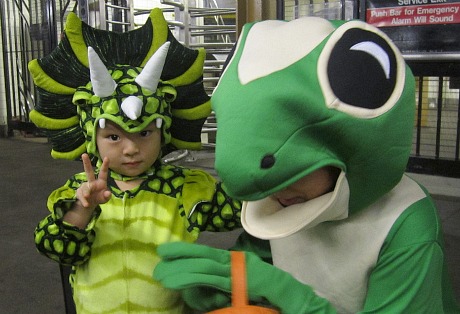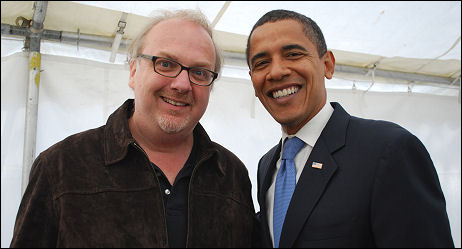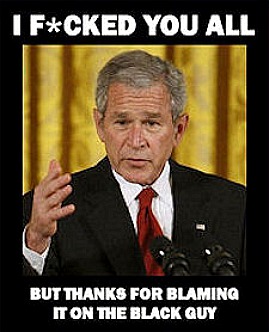
Day: October 31, 2010
Transformer
I never put on Halloween costumes, but these husky contacts are so cool I might buy a pair next year just for the fun of it. They were purchased at Abracadabra on West 21st Street for $99 and change. And they have all kinds of weird-looking ones, I’m told. Cat eyes, serpent eyes, Terminator eyes, etc.

Values Again
Every year I trot out the old saw about values and lessons being the main determining factor in the choosing of Best Picture winners by Academy voters. People recognize strong stories, first-rate artsy elements and high-level craft, but more often than not the tipping factor is a film “saying” something that the Academy recognizes as fundamentally true and close-to-home — a movie that reflects their lives and values in a way that feels agreeable.
Ordinary People beat Raging Bull because the values espoused by the former (suppressing trauma is bad, letting it out is good, wicked-witch moms are bad) touched people more deeply than the ones in Raging Bull. What values did Martin Scorsese‘s film espouse? Art-film values. Great goombah acting values. Black-and-white cinematography values. The only value that resulted in a big Oscar was Robert De Niro‘s commitment to realistic performing values — i.e. putting on 50 or 60 pounds to play fat Jake LaMotta. But there were no values in the film at all. What, it’s a bad thing to beat up your brother in front of his wife and kids?
American Beauty won the Best Picture Oscar because it said something that everyone (particularly workaholic careerists) believes to be true, which is that we spend so much time and energy running around in circles that we fail to appreciate the simple beauty of things.
Casablanca won because it said the right things about nobility and selflessness just as the U.S. was about to enter World War II. And because it was very well made and performed and had obvious romantic appeal, etc.
Gone With The Wind won in part because it presented the Civil War trials of Scarlett O’Hara as a metaphor for what the U.S. had gone through during the Great Depression, and said that if you don’t have gumption life will run you over and trample you down.
I’m not saying each and every Best Picture winner has won because of the values factor, but it does seem to explain the triumph of Dances With Wolves over Goodfellas (respecting and understanding other cultures and creeds is a spiritually nourishing thing vs. life in the Queens mob in the ’60s and ’70s was volatile and tacky and bloody). And Crash‘s victory over Brokeback Mountain (a values rebellion due to the over-70 Tony Curtis contingent being unable to stomach the idea of the iconic American cowboy figure being messed with). And Kramer vs. Kramer beating Apocalypse Now (learning to be a good dad vs. “the horror” in a psychedelic Vietnam).
So what values are espoused by this year’s Best Picture contenders?
The Social Network doesn’t espouse as much as observe and frame a particular social world that’s evolved over the last six or seven years. It says that (a) geniuses aren’t very good with the social graces and that they also have trouble with loyalty if it gets in the way of a better business plan, and (b) what this particular genius wanted all along was a Rosebud-y girl who dumped him.
The King’s Speech says the nobody is so high and mighty that they can’t be helped by a good tutor who talks plain and straight and can cut through the pretense and the bullshit.
127 Hours says that arrogance and thoughtlessness invites tragedy, and that survival is a duty that must be obeyed, even if it means a huge sacrifice. The glories of life are worth what whatever it takes to simply stay alive.
Black Swan says that the performing life is tough and that self-doubt can metastasize like a cancer if you don’t face it.
What does Inception say? The Kids Are All Right? Another Year? The Way Back? Blue Valentine?
Missed Best Part
I stood near the Sanity Rally stage with my leather computer bag slung over my shoulder for about five, five and a half hours. Standing, standing, standing. I just got hungry and tired and decided to shine it before Jon Stewart delivered his wrap-up speech. I finally listened to it this morning. Not bad.
Hammer Horror Meets Ealing?
The trailer for John Landis‘s Burke and Hare, a fact-based black comedy about a pair of early 19th murderers (Simon Pegg, Andy Serkis) who provided cadavers for cash for medical study in Edinburgh, tells you it’s been handsomely designed and shot. But critical reaction has been mixed since opening in the U.K. two days ago. Some felt it was funny (like TimeOut‘s Tom Huddleston) and some didn’t.
Variety‘s Charles Gant wrote on 10.26 that the “creaky comedy about 19th-century corpse retailers Burke and Hare, which reps an attempt by Fragile Films to match the tone and content of such beloved Ealing classics as The Ladykillers, should rattle some funny bones in native Blighty, but may face B.O. graveyards abroad.”
EdinburghGuide.com has posted a summary of reviews, and concludes that the verdict “is a resounding thumbs-down.
“Yes, there are historical inaccuracies — hardly surprising given that the true story of Burke and Hare is of grisly serial murders. And the Scottish accents are iffy. But the main complaint, in a spate of one star and two star reviews, is that Landis’s Burke and Hare is simply not funny enough.
“Where the script stumbles,” says Gant, “is in its absence of any especially funny setpieces or memorable lines. Instead, the scribes seem to think a general tone of wry amusement will suffice, with some slapstick thrown in for good measure.
The Guardian‘s Peter Bradshaw concurs in his brief, two-star review, saying that B&H “just isn’t as funny as it needs to be.” And Hollywood Reporter critic Ray Bennett dismissed it as “witless drivel.”
Burke and Hare is Landis’s first film since Susan’s Plan (’98).
I can’t avoid stating the obvious about Pegg, which is that his head has inflated into the size and shape of a basketball. He needs to cut down on the lagers and the sausage and invest in a treadmill.
Three
‘See, you’ve got three faces. Your first face is the one you’re born with, the one in the mirror every morning. Your second face is the one you develop thanks to ego, ingenuity and sensitivity, the one people identify as you. And then there’s your third face. No one ever gets to see that one. It’ll never show up in any mirror nor be visible to the eyes of parents, lovers, or friends. It’s the face no one knows but you. It’s the real you. Always privy to your deepest fears, hopes and desires, your third face can’t lie or be lied to. I call it my mind mistress, guardian of my secret utopias, bitter disappointments, and noble visions.” — quote attributed to director Sam Fuller (and passed along last year by Steven Gaydos).
Hickenlooper in Quotes
It seems like a fair tribute to assemble some of the comments posted in this space by the late George Hickenlooper. I knew Hickenlooper well enough to hear some of his more pithy observations (he was a shrewd judge of character). Alas, none of these quotes are especially meditative or philosophical. Like all Hollywood Elsewhere commentary they’re about dispute. If anyone has found any further Hickenlooper quotes that would make this a more well-rounded portrait, please forward.

On the circumstances behind the photo of himself and Barack Obama, which happened in concert with the filming of Hicktown:
“It’s a funny picture. I’d just finished filming with Obama for all of the three minutes he had before speaking to 100,000 folks in Denver on October 26th. After I finished shooting a photographer was standing there and believe it or not Obama said, ‘Let’s get a picture.’ I wasn’t even about to ask. I was so damn starstruck. and believe me I’m never starstruck. After the picture my cousin John Hickenlooper [i.e., the current Democratic candidate for Colorado governor] shared a joke with Obama that was based on an earlier conversation I’d with with John, and then Obama mentioned the joke in his speech that night. It was really impressive. At that moment I realized, this guy isn’t your typical robot politician. He actually listens.”
On Francis Coppola’s Releasing Hearts of Darkness on DVD via Paramount Home Video in 2007 Without Mentioning It to Hickenlooper, Who Co-Directed, Much Less Asking or Allowing Him To Record a Commentary Track:
“This is a real slap in the face to me and to filmmakers in general,” Hickenlooper told the N.Y. Observer. “It’s very disillusioning because I worship Francis. He’s trying to portray himself as this icon of artistic integrity, and yet simultaneously he’s completely burying me and my [former directing] partner.”
On The True Authorship of Hearts of Darkness:
“I think the more appropriate way to look at it is that Hearts of Darkness is Eleanor Coppola’s story. It’s not her film. Hardly. It’s her story. But that’s because I decided to make it her story.
“When I got involved with this project 20 years ago, Showtime was going to make it a one-hour TV special called Apocalypse Now Revisited. It was going to be basically an hour-long special about how they did the war pyrotechnics. It was going to be dull and stupid.
“At the time I told Steve Hewitt and my partner Fax Bahr that “nobody cares about a making of movie, especially one that is 14 years old.” I argued that the film had to have an emotional component. At the time, no one was familiar with Eleanor’s diary ‘Notes.’ My father had purchased it for me on my 16th birthday. I ate it up.
“When I got involved with HoD, I advocated using her diary as the narrative thread. I got incredible resistance from Showtime, and I got initial resistance from Eleanor. Not much, but some.
“Once I was able to convince everyone that the film would best be told through her narrative voice, it was then and only then it became her story.
“Eleanor did shoot the footage in the Philippines back in 1976, but she only stepped twice into our cutting room on the back lot of Universal. Twice. For a total of eight hours. I was there for a year, 15 to 18 hours a day. So it’s not a film by Eleanor, but I guess it’s sexier from a marketing angle to make it look that way.”
On The Influence of Les Blank on Documentarians, and particularly in response to Hip-Hop Homey asking “who cares if Blank’s Burden of Dreams is streaming for free?”
“‘Who cares if it’s streaming for free?’ Who cares if someone breaks into your home and cleans out your refrigerator? Independent filmmakers rely on funds for our work so we can continue to make films. What planet are you on, Hip Hop? Give me a break.
“As far as Burden of Dreams it was the main inspiration for Hearts of Darkness. Without Blank’s film, HoD would have been nothing more than a behind-the-scene look at how Francis blew up Do Long Bridge. Blank is the most powerful and honest documentary filmmaker there is. He avoid navel-gazing at all costs and his work doesn’t have that Pottery Barn sheen which afflicts most filmmakers today.
“We actually licensed some footage from Les for Hearts of Darkness. The entire Napa sequence at Francis’ vineyard was shot by Les during the celebration of Coppola’s 40th birthday party. I’d tell you this and more if Lionsgate were interested in Fax Bahr and I doing a commentary for the new Bluray, but apparently they’re not.”
The Relationship Between Himself, Billy Bob Thornton and the two Sling Blades (i.e., Thornton’s feature plus Hickenlooper’s Some Call It A Sling Blade):
“I enjoyed Billy Bob’s Sling Blade. It was different than the feature Billy Bob and I had discussed making. The film I wanted to make would have been slightly darker in tone. The Karl character that Billy Bob portrayed in the feature was a little softer and more audience-friendly. Our original plan was to use the short as the first act of the feature and then once Karl leaves the sanitarium the film pays homage to The Wizard of Oz and slowly fades to color, only to return to black-and-white at the end.
“There is no question that Billy Bob is a great talent, and yet his abusive temperament made him very difficult to deal with. I ultimately walked away from the film and was not ‘passed over’, as the Harvey Weinstein spin machine tried to suggest. My contribution was primarily to the tone and many of the supporting characters in the short. Billy Bob and I developed the feature to some length. At the time Billy Bob’s idea was to have Karl released and then meet up with a woman who was a third-degree burn victim. I felt this was too heavy handed and suggested that Karl should develop a relationship with a young boy. After seeing the film it appears to me he used my suggestion.
“Billy Bob did a great job with the feature on his own and he deserves the career he has had. At the same time he has left a wake of very distraught folks who have had to deal with him intimately. He has a very sweet, charming side to him, but there clearly is some kind of disorder there that he is very aware of. That’s really all I have to say about it. I think the short is worth another look. Thanks, Jeff, for recognizing it.”
On The Late Simon Monjack:
“Simon Monjack had nothing to do with Factory Girl or the screenplay. He filed a frivolous lawsuit against us weeks before principal photography, making bogus claims that we had stolen his script. He held us literally hostage and we were forced to settle with him as he held our production over a barrel.
“I posted this information on IMDB two years ago in order to warn people because Monjack was using his Factory Girl ‘credit’ to solicit and then steal money from other investors. Then one night at three in the morning Brittany Murphy (who was a good friend and a girl I had come close to casting as Edie Sedgwick) called me in tears, begging me to take this posting down. It was going to ruin her husband. I told Brittany it was the truth and warned her, as many other did, about Monjack who had a criminal record and a long, long list of legal complaints against him. In the end I told Brittany I would do it for her and remove the post because I really cared for her as a friend.
“The last thing I told Brittany is ‘Do you know who this guy is? I mean, do you really know him. Do you know what you’re doing by marrying him?’ At this point Brittany became angry and told me she knew Monjack better than anyone and then hung up on me. A few months later I tried to call her to see if she was alright and Monjack would not let me speak to her. I so so feared something bad would happen. I thought he might take her for all her money. I’m sure the guy is in deep mourning in the wake of her death. But one can surely speculate that his clear lack of character and background couldn’t have led to the most healthy environment. I really feel bad for Brittany. She was a sweet angel and didn’t deserve anything bad to happen to her ever. May she rest in peace. I will miss her. We will all miss her.”
On The Passing of Maury Chaykin:
“I’m very saddened by the death of Maury. He truly was one of the most superb actors I have ever worked with. You could sense his greatness on the set. He has a few scenes in Casino Jack, and the entire cast and crew was in awe of his immense talent. And when I say talent there is only one way to underscore that, and that is by saying it was comparable to Brando’s. He was a Canadian Brando whose performances were so connected to his own inner life that every choice he made, even different, was pitch perfect. It was a great honor to work with him.”
On The Matter of “Instant Soul Reads”:
“Sorry, guys, I have no soul. I’ve tried to acquire one but I keep getting denied. Every time I reach for that the big brass ring, I keep finding myself in dogtown with all these low-lifes. Perhaps my life would be simpler if I were just a person unknown amongst all these folks who have hearts of darkness, but alas there’s no relief for any man from elysian fields or factory girl or mayor of the sunset strip. Perhaps I should try my luck at the casino, jack. And the bounty I took out three years ago ended up costing me only 40 dollars and the fellow’s head was shrunk and is now hanging from my rear view mirror. It’s very charming…thanks, guys. I really shouldn’t spend so much time on the internet.”

